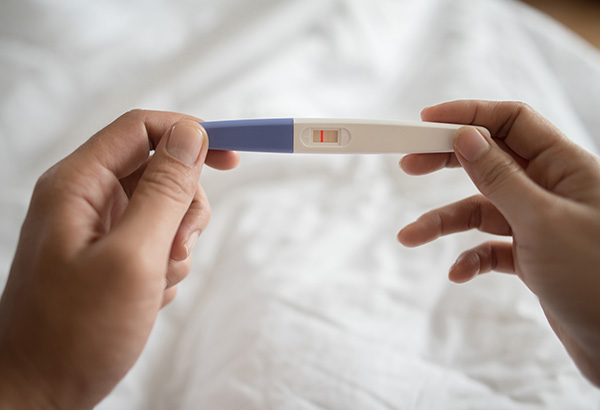Pregnancy test after IVF: when is it most reliable?

Pregnancy test after IVF: when is it most reliable?
One of the most common doubts our patients at URE Centro Gutenberg have is about the pregnancy test. In assisted reproduction treatment, whether the patient is undergoing artificial insemination or in vitro fertilisation, the question that comes up is: when can the long‑awaited pregnancy test be taken?
In this article we would like to shed some light on this subject, properly explain what the pregnancy test involves and discuss the best moment to take the test to avoid mistakes.
What does a pregnancy test measure?
Urine and blood pregnancy tests measure the presence of the beta-hCG hormone, human chorionic gonadotropin.
This hormone is produced by cells in the embryo called trophoblast cells which will go on to form the future placenta. Once the embryo implants in the mother’s endometrium, the beta‑hCG hormone is passed on to the mother and begins to circulate in her bloodstream.
As we were saying, this hormone can be measured in blood and in urine and it tells us, or confirms, that embryo implantation has occurred.
What types of pregnancy tests are there?
As beta‑hCG flows through the mother’s bloodstream and is eliminated by the kidneys, there are two ways to measure its presence:
- In urine, using what we call an at‑home or pharmacy pregnancy test. These are the tests you can take yourself. Only 4 or 5 drops of urine are needed, ideally the first urine of the morning. The result is qualitative, meaning it will tell us if you are pregnant or not with a positive or negative test result. Normally the result is expressed with the + symbol for a positive result or with the – symbol for a negative result. However, there are also tests which show one vertical line (|) if the test is negative, or two vertical lines (||) if the test is positive.
- In blood, with a clinical lab test. The result of this type of test may be qualitative, or even quantitative, thus telling us the exact level of the hormone that is circulating in the mother’s bloodstream. The value depends on how many weeks pregnant the patient is and normally doubles every 48 hours until week 10 or 12 of pregnancy, at which point the level stabilises until birth. This test is the easiest and fastest way to diagnose a pregnancy.
When should you take a pregnancy test?
If you are trying to conceive naturally it’s recommended that you take a urine test after the date your period should have come.
There are highly sensitive urine tests that are able to detect pregnancy a few days before a missed period. The later the test is taken, the more reliable the result will be and there will be fewer chances of getting a false negative. With assisted reproduction treatment at our fertility clinic in Spain, we order this test at a specific time depending on the treatment which was carried out.
For patients who have undergone a cycle of artificial insemination, either with partner or donor sperm, we request a urine test 15 days after the insemination took place.
This is in contrast to a cycle of in vitro fertilisation, using own or donor eggs, for which patients take a urine test 16 days after egg collection or the day the egg donation was carried out. In this case, patients are also asked to confirm their result with a beta-hCG blood test.
If the patient undergoes a frozen embryo transfer, depending on what day of development the embryos were vitrified, the theoretical “ovulation” date is recalculated and 16 days later a pregnancy test is taken.
Can the result of the pregnancy test be wrong?
Yes, you should be aware that it’s possible for a pregnancy test to give a false negative, just as it’s possible for it to give a false positive.
The test could give a negative result even if the woman is pregnant if the test is taken too soon, or also in women with very irregular menstrual cycles.
On the other hand, false positives (when the test gives a positive result but the woman is not actually pregnant), can occur in cases of IVF in which hCG (Ovitrelle) was prescribed and the test is taken too soon. In these cases, the test will give a positive result due to the hCG found in the medication Ovitrelle, and not from a pregnancy.
Other times we may obtain a false positive, though infrequent, due to tumors that produce hCG, such as in a molar pregnancy or with choriocarcinoma.
The medication used in fertility treatment such as the oral contraceptive pill, progesterone, oestrogens, FSH and LH… except for hCG (Ovitrelle), do not have an impact on the result of the pregnancy test.

Do you have any questions about this matter? We can help you! Contact us!

